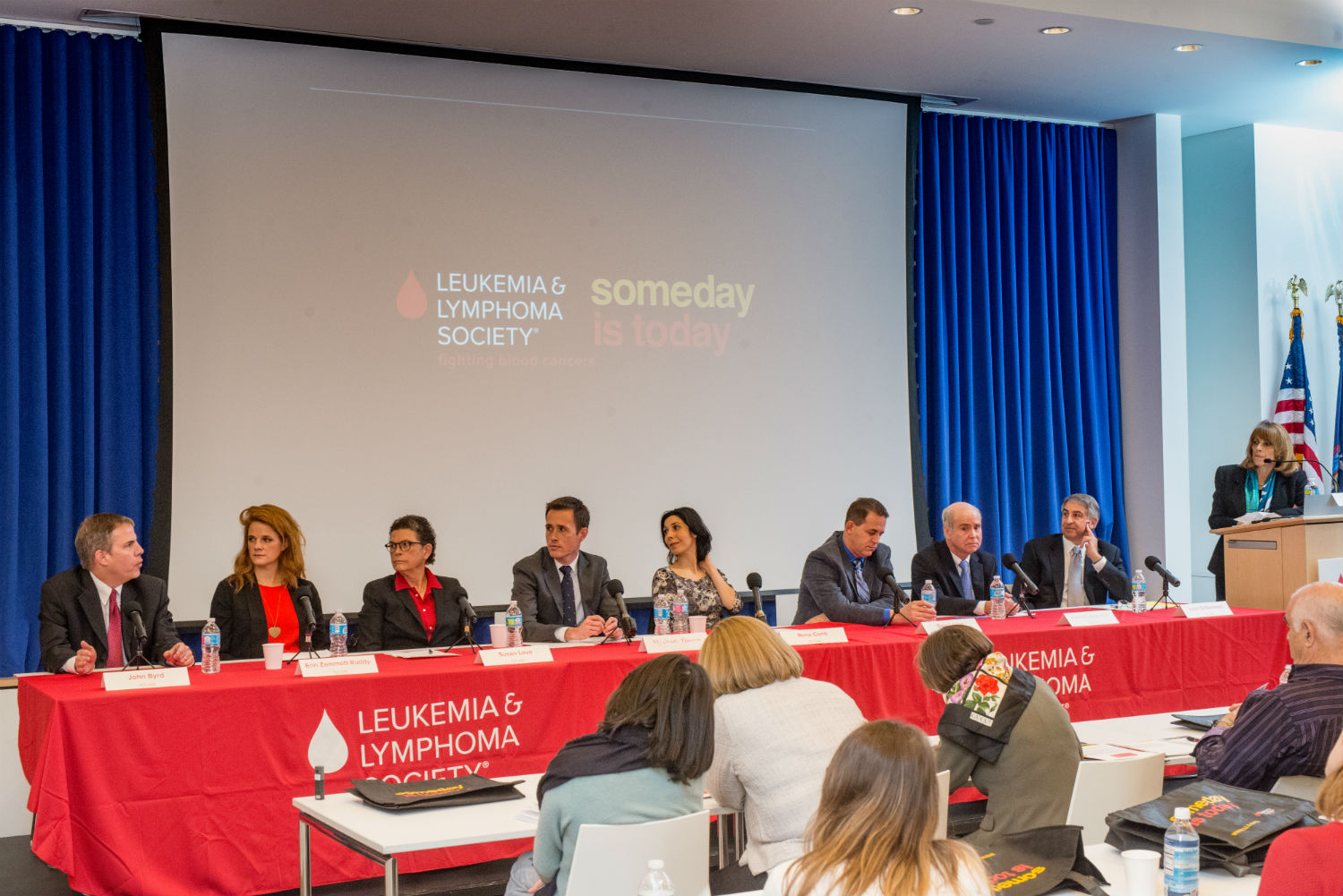Click here for a comprehensive media toolkit.
New York – February 25, 2016 – A panel of world renowned thought leaders from research, clinical practice, policymaking, pharmaceutical industry and patient advocacy convened today to discuss and debate the latest advances and insights into blood cancer research and treatment, drug costs and patient access, and patient advocacy and policy. The roundtable was organized by The Leukemia & Lymphoma Society (LLS), the world's largest voluntary health agency dedicated to fighting blood cancer.
“As Vice President Biden initiates the ‘moonshot’ mission to eradicate cancer, the role of the blood cancers, and the impact of research to accelerate new treatments and cures, will play a pivotal role in defining what is possible across many cancers,” said Louis J. DeGennaro, Ph.D., president and chief executive officer, LLS. “In fact, blood cancer research, much of it led and funded by LLS, has had a significant impact on cancer overall. Roughly 40 percent of cancer drugs developed since 2000 were first approved to treat blood cancer patients, with many later being approved or tested for other forms of cancer and chronic diseases.”
In addition to Dr. DeGennaro, the expert panel included:
- Kenneth Anderson, M.D., Kraft Family Professor of Medicine, Harvard Medical School; director, Jerome Lipper Multiple Myeloma Center and LeBow Institute for Myeloma Therapeutics, Dana-Farber Cancer Institute
- John Byrd, M.D., D. Warren Brown Chair of Leukemia Research; professor of medicine and medicinal chemistry and director, Division of Hematology, Department of Internal Medicine, The Ohio State University Wexner Medical Center
- Mike Ybarra, Senior Director, PhRMA
- Rena Conti, Ph.D., associate professor of health policy and economics at The University of Chicago, Department of Pediatrics, Section of Hematology/Oncology, and Department of Public Health Sciences
- Ross L. Levine, M.D., member, Human Oncology and Pathogenesis Program, attending physician, leukemia service, Department of Medicine, and Laurence Joseph Dineen Chair in Leukemia Research, Memorial Sloan Kettering Cancer Center
- Susan Love, M.D., chief visionary officer, Dr. Susan Love Research Foundation
- Erin Zammett Ruddy, author, blogger, survivor
The panel was moderated by Laura Landro, assistant managing editor and columnist, The Wall Street Journal. Ms. Landro is a chronic myeloid leukemia survivor and offered her unique perspective as both a journalist and former cancer patient: “The landscape of blood cancer treatment has changed dramatically over the past several years. As a survivor and a journalist I am fascinated by discussions such as these that are focused on the future of treatment and overall care. It is extremely encouraging to see how much collaboration is occurring across the various stakeholders.”
“This is an extremely exciting time in the field of blood cancer research and treatment. Innovations in cancer treatments are reaching patients at a remarkable pace; however, the death rate from certain blood cancers remains stubbornly high, with treatment protocols that haven’t changed in decades,” added DeGennaro. “We are proud to have assembled this distinguished panel to elevate, collaborate, and bring urgency to the discussion about advances in blood cancer research and healthcare policy.”
Today, there are virtually no means for preventing or early screening for most blood cancers, and more than one-third of blood cancer patients still do not survive five years after their diagnosis. At the same time, survival rates for many blood cancer patients have doubled, tripled and even quadrupled since the 1960s. The panelists noted this dichotomy and discussed the barriers and opportunities facing the blood cancer community in advancing new treatments, including drug costs and access, precision medicine, patient engagement, and regulatory and policy changes.
Consensus emerged from the diverse group of panelists around the collaboration that is occurring across the ecosystem between the scientists, academics, pharmaceutical companies, regulators and advocacy groups. Panelists also focused on the big role precision medicine has played and will continue to play on the development of cancer treatments. Overall, the panelists recommended that the following actions be taken to advance blood cancer research, treatment and advocacy:
- Collaboration must continue across the board in order to advance the development of treatment and support patient care
- A focus on precision medicine will continue to positively impact the development of cancer treatments
- There needs to be a continued focus on the issue of patient access and affordability
- Enabling patients to assist in generating patient reported outcomes will help with overall patient care during and following treatment in order to improve quality of life
- Venture philanthropy will continue to be an important part of the drug development ecosystem
About The Leukemia & Lymphoma Society
The Leukemia & Lymphoma Society ® (LLS) is the world's largest voluntary health agency dedicated to blood cancer. The LLS mission: Cure leukemia, lymphoma, Hodgkin’s disease and myeloma, and improve the quality of life of patients and their families. LLS funds lifesaving blood cancer research around the world, provides free information and support services, and is the voice for all blood cancer patients seeking access to quality, affordable, coordinated care.
Founded in 1949, LLS has chapters throughout the United States and Canada. To learn more, visit www.LLS.org. Patients should contact the Information Resource Center at (800) 955-4572, Monday through Friday, 9 a.m. to 9 p.m. ET.

